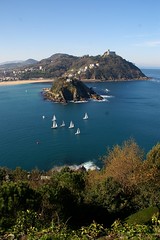Do you ever wonder why has Spain resorted to such vicious and violent extremes to prevent the Basque Country from regaining its sovereignty?
This article published at Euroresidentes may dispel one of the many mysteries regarding Madrid's efforts to perpetuate its colonialist hold of Hegoalde, the southern portion of Nabarra:
Oddly enough, some "pundits" insist that Nabarra could not survive economically on its own.
Same goes for Catalunya.
This article published at Euroresidentes may dispel one of the many mysteries regarding Madrid's efforts to perpetuate its colonialist hold of Hegoalde, the southern portion of Nabarra:
Region in Spain with highest total personal income
Inhabitants in the Basque Country the richest in Spain
The Basque Country has overtaken Madrid as the area of Spain with the highest capita per inhabitant. Figures published yesterday by the Spanish National Institute of Statistics (INE) showed that GDP per inhabitant in Madrid was 29,965 euros compared to 30,599 for inhabitants in the Basque Country. Extremadura and Andalucía remained at the bottom of the list although figures show that the difference in GDP between parts of Spain is going down year by year. The average income per inhabitant in Spain is now estimated at 23,396 euros.
This is the first time that Madrid has lost its place at the top of the list since 1995 when the INE began to publish these figures although this change has been put down to more to changes in the Basque Country’s demography to its economic growth. In fact, the economy in the Basque Country has grown less than the national average over recent years. However, the population has hardly grown at all. Since 1995 it has only grown by 2.3% while the population of Madrid has increased by a massive 21%.
Income per inhabitant has fallen in the Balearic islands. Figures for 1995 showed that income per inhabitant was equivalent to 120% that of the national average while now it is just 108%. However, the population in this part of Spain has also grown by 37% over the last 12 years. Furthermore, the incorporation of more workers in its economy has not led to economic growth. The Canary islands is also a similar case.
The figures just published for 2007 show that Catalonia has the highest GDP in Spain valued at 196,000 euros, followed by Madrid, Andalucía, Valencia and the Basque Country. Aragón showed the biggest growth at 4.5% compared to an average growth in GDP of 3.8% for the rest of Spain. The INE showed that Aragón, Castilla-La Mancha and Galicia all had thriving economies with strong manufacturing sectors. Economic growth in Aragon was attributed mostly to building work in preparation for the Expo which starts in June.
Continues...
Oddly enough, some "pundits" insist that Nabarra could not survive economically on its own.
Same goes for Catalunya.
.... ... .











